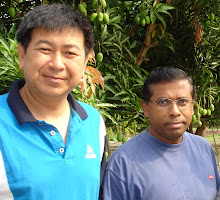Unconditional Love of Jesus through MannaBears Nutrition
With a growing desire to adopt another family with children lacking proper nutrition, our journey on 22nd May into one of the slums in Dhaka was profoundly challenging. Our key contact had identified this family as being in need. The access to this place wasn't easy. Every rickshaw we flagged down were unwilling to take us. They complained of bad road. Finally we found two rickshaw walas, who were willing if we paid them double. As we were in no position to argue, we took their offer.
It was a pleasant surprise to Mr Sydul and family that we came to their one room abode. This single room, the size our small store room was where they ate, slept and did most of their chores. The unsightly canal that flowed behind contained all the raw sewage that flowed out of the slum.
Mr Sydul, married with three children is a daily rated labourer. He and his elderly mother have to work hard daily to provide for the family.
Praise God, through the sponsorship of willing hearts in Singapore, we introduced MannaBears(R) as a good source of nutrition for Mr Sydul's children. We pray that, through the access MannaBears(R) is beginning to create, we can bring the unconditional love of Jesus to many malnourished children of Bangladesh.









